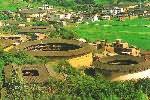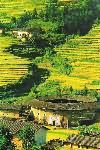- Getting around Lijiang. Dont stay in the Old Towns more than 2 days, there is nothing to do. KRISS Oct 9, 2013 05:46
- 2013 Beijing Temple Fair BENNYLAU Feb 26, 2013 03:29
- Malaysian traveling from KUL - LAX vis Shanghai PVG ZATI_DY Jan 3, 2013 20:15
The Stongholds of the Southern Hakka
- Views: 5181
- |Vote: 0 0
- |Add to Favorites
- |Recommend to Friends
History
Migrating south from the northern areas of China to escape civil unrest the Hakka of Fujian often settled in remote and isolated mountain regions where they would be susceptible to attack from bandits and marauders. This seems to have greatly influenced the style of the homes they built to protect themselves not only from attack but from the elements as well.
These buildings known as Tu Lou, literally meaning ‘earth structures’ are usually square or circular in shape, with only one entrance. Often as tall as four stories and constructed of rammed earth they have no windows on the ground floor as a safeguard against attack. Windows in the thick walls acted as weapon ports while under attack and provided cross ventilation for the stronghold. Inside brick firewalls at regular intervals help prevent the spread of fire should one break out and narrow wooden stairs lead to the balconies on each floor. They are able to withstand earthquakes and tremors, are cool in summer and warm in winter.
Hakka means ‘guest families' and often as many as 1000 people in large family or clan groups lived together in a single stronghold. Each floor serves a different purpose, with kitchen and livestock on the ground floor, family living on the second and perhaps third floors and storage of grain and goods on the top floor. Strongholds vary in size from those housing several hundred people or the smallest, just two stories high and home to just six families. These date back several hundred years and many families still live within them today. The central area usually has one or more communal wells and a place for worship.
The Hakka also took education very seriously and this was also a central part of their communities. The Hakka are today dispersed throughout southern China, Asia and around the world. Although they are not considered an ethnic minority they have a very distinct dialect and a culture all their own. Neither did they follow the practice of foot binding and as a matter of interest, four of Asia’s most influential leaders have been Hakka, namely Dr Sun Yatsen, Deng Xiaoping, Lee Kuan Yew and Mao Zedong. Many more hold or have held significant political posts throughout Asia and around the world.
When I arrived in Yongding late in the summer, I was met by a young teenager who offered to find his older brother to show me around in exchange for a chance to speak English with me. I wasn’t too sure I felt like company that day. Sometimes it’s nice to just wander around these simple villages enjoying the quiet and never really understanding too much apart from what you can see so I wandered off hoping he wouldn’t find his brother.
Before I got too far down the road a pleasant young man, home from university in Fuzhou for the summer holidays, joined me. I explained that I would prefer to be on my own and hoped he didn’t expect to get paid for any services. He just followed me around chatting and showing me a thing or two and taking photos for me.
This area has a collection of strongholds mostly circular and rectangular in shape and several have been restored and opened as a guesthouse and museum. I was invited to sit and sip some local tea with the friendly vendor in one of the small souvenir stores. It was wonderfully cool inside. Two pretty creeks run through this village and a huge Banyan tree on one bank near the water wheel was some welcome shade from the hot sun. I was warned that food here was expensive and after I finished looking around I offered to buy my young escort some lunch for his trouble.
First he wanted to show me the home of his aunt in the stronghold that until just six years ago his family had also lived. It was a medium sized building beside the car park and bus stop so he took me inside to meet his aunt and show me around. This one was not so well maintained inside, had a few big cracks in the exterior wall, with the sights, sounds and smells of daily life all around us and many of the households had since moved out. Dogs and chickens seemed to have the run of the place.
We took a simple lunch prepared by his mother across the street in her small restaurant. The only thing I can remember now was how tough the chicken meat was, but they were all so hospitable and instead of treating him to lunch I was treated as their special guest. Towards the end of our meal his uncle came back. We had met him earlier. He has a motorbike and makes a living as a taxi around the neighbourhood. For a small fee he offered to take me to some of the other strongholds in the district that were considered worth a visit. I agreed so long as they promised to have me on a bus back to Longyan in time to catch my bus back to Xiamen that afternoon.
It was a deal. So off we went all three of us on the motorbike in true Chinese style, with me sandwiched between the uncle and the student, none of us wearing helmets. I wasn’t the only one out taking photos that day. There was a rather professional crew with a lot of expensive camera equipment moving from one location to the next looking for the best angle and light to catch the unique character of these remarkable old buildings in the midst of spectacular farmlands. So was I but I did not have the luxury of the lenses or the time.
So for more than an hour we toured the villages over bumpy and windy roads, stopping sometimes for me to have a closer look inside or take a panoramic shot from above. Around every corner there was a chance of seeing more of these unusual strongholds, some circular or square, others rectangular or semi circular and even the odd triangular one. Some stood in groups and some stood alone nestled into a backdrop of rice terraces. How I wished I had come to spend the night in this fascinating place rather than just a few short hours. I considered my money well spent that afternoon as I farewelled my companions from the bus. One day I hope to return.






 Copyright © 1998-2026 All rights reserved.
Copyright © 1998-2026 All rights reserved.